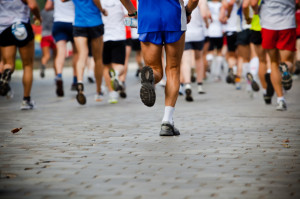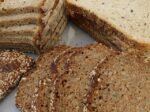 Distance running is an aerobic activity and race lengths are usually 10km, half marathons (21.1km) and marathons 42.2km.
Distance running is an aerobic activity and race lengths are usually 10km, half marathons (21.1km) and marathons 42.2km.
These events along with “fun runs” (and walks) of varying length and degree of difficulty are becoming popular, attracting family and community groups; recreational, elite and club member participants.
Running events are often attached to fundraising initiatives and may also include 3km “fun runs for children.
If athletes take the time to learn about sports nutrition, so that they can provide the nutrients their bodies need for extra levels of stress and work loads, they will not only improve their physical performance and health but also their enjoyment of the event.
Training Requirements
People entering races for the first time are often supplied with a 12 week training protocol by race organisers that involve 5-6 training sessions per week depending on the race they are entering.
Elite runners may train for 6-7 days per week (sometimes twice per day) often running 150-200km/week depending on the event for which they are training. In addition they may include speed and interval training plus core strengthening sessions at a gym.
Usually training programs at this level are planned for the year ahead and may include participation in key local, national and international events depending on the aspirations of the athlete.
Nutritional requirements
The energy provided by the ideal baseline diet for distance running should be low in fat (20-25%), high in carbohydrate (> 55-65%) and with moderate amounts of protein (15-20%).
Ideally carbohydrate supplied by low Glycaemic Index (GI) plant foods such as fruit and vegetables, bread and cereals should be the main source of energy and protein from mostly animal sources such as cheese, milk, meat, eggs and fish to aid body growth and repair.
On top of this baseline diet can be added high GI snacks such as sports drinks and bars during the course of training or events to boost energy.
Why is carbohydrate important?
- Dietary carbohydrate is broken down into blood glucose circulating energy, and some is also stored, in limited amounts, in the muscles as glycogen
- An increase in the intensity of an exercise will increase the contribution of carbohydrate in providing energy. As the length of the exercise continues, the source of this carbohydrate may shift from the muscle glycogen pool to circulating blood glucose. However, if blood glucose cannot be maintained, the intensity of the exercise performed will decrease.
- This is why it is important for athletes to start their training/competition with higher levels of muscle glycogen so they are able to train/ perform harder for longer.
- Along with the provision of energy, carbohydrate also has a role in maintaining immunity. Therefore it is important to ensure that (particularly elite athletes) consume adequate amounts of carbohydrate to reduce the risk of injury and overtraining.
Assembling sufficient food supplies together to meet their daily carbohydrate volumes can be “a mission” as athletes usually have busy lives trying to juggle the demands of family, work, school and training. However the effort taken to eat enough can provide the winning edge in performance on “the day” as well as quicker recovery and better long-term health.
How much carbohydrate do we need?
- The amount of carbohydrate required depends on the level of intensity and duration of the exercise and body mass of the individual.
- The type of food used at each level will depend on total energy needs, ease of handling and absorption.
Table 1 The amount and types of carbohydrate foods required for different levels of exercise.
| Level of exercise | Level of activity | Time taken | Event | Carbohydrate target | Type of food |
| per day | (g) per kg/body mass | ||||
| Light | Low intensity, skill based | Up to 1 hr | 10km | 3.0-5.0 | Mouth rinse or solid food |
| Moderate | Moderate exercise plan | >1hr | 1/2 marathon | 5.0-7.0 | Solid food |
| High | Endurance program | 2.0-4.0hr | Full marathon | 6.0-10.0 | Multiple transporter |
| Moderate-high intensity | e.g. sports bars,gels | ||||
| Very high | Extreme commitment | >4-10hr + | Ironman | 8.0-12.0 | Multiple transporter |
| Medium-long intensity | e.g.sports drinks |
The Periodization of Nutrition
To understand the needs of an athlete it can be helpful to “periodize” nutrition to suit the level of energy needed from a typical baseline day through to greater needs for training and competition followed by recovery.
Baseline:
This refers to normal daily consumption of all foods. In the case of carbohydrate solid carbohydrate foods (e.g. fruits, vegetables, breads and cereals) are sufficient to meet daily activity and light exercise up to one hour.
Pre-event:
Taking the opportunity to eat before training or an event will improve results. If undertaking an early morning training session or event then athletes should choose a high GI snack such as toast or crumpet with honey/jam.
However if there is a time lag of 2-3hrs between eating a meal and exercising (e.g. up at 6am and competing at 8-9am) then at 6-7am athletes may choose low GI carbohydrate with protein such as cereal, fruit and yoghurt.
As the pre-event period can extend to an 8-10 hour period the meal an athlete eats the night before an event can be important. Ideally this should contain low-fat, carbohydrate rich foods. E.g chicken pasta meal, or Asian style meal with boiled (rather than fried) rice is preferable to a high fat meal such as fish and chips. Alcohol should be avoided.
Training:
When training extends beyond an hour solid food such as fruit or a cereal bar will be sufficient. However if the intensity of exercise increases or training extends beyond 2 hours then other foods need to be introduced that provide carbohydrates in an easily absorbable form.
Multiple transporters are foods that combine glucose and fructose in the form of sports bars, gels and sports drinks that can provide portable energy in a convenient, measurable form.
Competition:
One of the most important pieces of nutritional advice is for athletes to practice their sports nutrition well before the day of the event and to study the course so that drink stations and toilets can be factored into their plan.
For events that are run for less than 45 minutes very little extra carbohydrate is required. Research has found that a simple mouth rinse of carbohydrate fluid can provide sufficient stimulation, via the oral receptors to the brain, to make running easier by triggering a reduced perception of effort.
Recovery:
During the course of competition or training, muscle glycogen is used for energy and muscle fibres can also become damaged.
The period within 30mins to 2 hours after an event or training session the muscles are more receptive to replacing the glycogen used during an event.
Good recovery is very important to the success of the next training session or run, particularly when athletes are involved in two training sessions/day. Selecting foods, within this period, that contain high GI carbohydrates (such as a banana, a honey or jam sandwich) followed up by foods with low GI and protein (such as yoghurt, creamy rice, milk shake or having a meal containing protein) can speed the recovery process.
Other nutritional issues
Protein
Is important for tissue growth and repair and is found mostly in food sources such as meat, fish eggs, milk, cheese and beans etc. Athletes require on average daily requirement for protein is 0.8g/kg (1.3-1.8g/kg per day if strength training). Children aged 4-8yrs need 0.9/kg/day.
Recent research involving protein suggests that on a normal day (baseline) 3-4 servings of protein spread over the main meals of the day may provide better protein utilisation by the body than one single meal (bolus) or “grazing” (pulsing) patterns of eating.
Fat
Elite distance runners are usually lean, lightly muscled (particularly in their upper body) and small in stature.
To maintain low body fat levels athletes need to limit their intake of saturated fat and cholesterol containing foods. This can be achieved by using low-fat dairy products, lean red meats, and limiting the intake of cakes, biscuits and fried foods.
Switching to foods that provide more polyunsaturated fats such as found in fish, legumes, polyunsaturated margarine, oils, nuts and seeds will still provide sufficient fatty acids to maintain healthy nerve and brain tissue and to regulate hormone levels without unnecessary weight gain.
Hydration
During competition water is sufficient to meet the needs of most competitors for the first 1-1.5hrs.
After this period more energy is needed and sports drinks with a carbohydrate content around 6-7% are helpful.
Athletes should avoid cold or carbonated drinks, fruit juice and high energy drinks (carbohydrate 8-12%) as these can cause gastrointestinal discomfort.
Taking the opportunity to top up fluids at drink stations along the event route is important to successful hydration.
As it is possible to become overhydrated and individual fluid needs vary according to environmental conditions, serious athletes should undertake sweat loss testing during training. This can help them to build up a record of their normal losses under different conditions of: wind, rain, temperature, season, terrain and altitude.
Kids “fun runs”
Involving children in “fun runs”, particularly when other family members compete as well, can be a great way to introduce, even quite young, children to exercise.
With all the excitement children may be too nervous to eat although a few practice runs in the weekends leading up to the event, with comments from parents that “sports nutrition is really important” will definitely help.
Encouraging children to have a bowl of cereal with fruit and yoghurt an hour or two before the event is ideal. However if time is scarce, or nerves affect their food intake, then a liquid meal supplement or smoothie will help supply the energy they need.
Practicing a good breakfast, and making adjustments when necessary, is the key to success and confidence building.
Carbohydrate loading
Muscle glycogen levels are usually within a range of 100-120mmol/kg ww (wet weight). Undertaking some carbohydrate loading prior to an event can help to raise these levels to 150-200mmol/kg ww. This difference may represent an improvement in performance over a set distance by as much as 2-3%.
Carbohydrate loading will only help individual athletes competing in events that extend for a continuous period at moderate to high intensity for 90 minutes or longer.
Originally the “glycogen building process” developed in the 1960’s involved a 3-4 day ‘depletion phase of hard training plus a low carbohydrate diet. This was done to stimulate the enzyme glycogen synthase and was then followed by a 3-4 day ‘loading phase’ involving rest and a high carbohydrate diet to increase glycogen storage.
Now the depletion phase is not considered necessary. Instead 1-4 days before the event exercise is tapered off and a high carbohydrate diet (7-12g/kg body weight) recommended. Athletes will notice an increase in body weight by around 2-3kg as the body loads water as well as glycogen.
Gastrointestinal upsets
Runners may experience problems with diarrhoea, cramping and bloating during long races. This is often due to imbalances in fluid and carbohydrate intake and increased stress.
Dietary fibre and the type of sugars ingested can also play a part. For this reason some athletes may reduce their dietary fibre the day before a main event or replace some of their solid meals with liquid meal replacements.
Iron deficiency
Normally athletes consume such large volumes of food they seldom lack any vitamins or minerals.
However for some female athletes more iron may be needed. Particularly for those athletes who have increased iron losses through sweat, heavy menstrual periods, gastrointestinal bleeding or a poor intake of iron rich foods.
These female athletes should check with their doctor before supplementation as an excess of iron can compromise immunity.
Dietary supplements
Dietary supplements cannot make up for an unhealthy diet.
Sports Dietitian’s are concerned for particularly non-elite athletes who may, on a daily basis, consume multivitamin pills, protein shakes, recovery drinks and power bars.
These practices can lead to the accumulation of very high levels of some vitamins and minerals which in excess can be toxic.
Elite athletes should also take care, particularly if taking herbal supplements as some brands can be contaminated with banned substances. This could result in an athlete failing dope testing.
If contemplating supplementation athletes should always be directed by their doctor.
If you would like to have help to develop your own sports nutrition plan or need help to work through any of the issues discussed above then contact us today.
For more information read Lea’s articles
Taste is important to fluid consumption
Muesli and sports bars
Sports nutrition for senior athletes
Vegetarians face extra hurdles
The gut-brain axis is important to sporting performance
Don’t let disordered eating ruin your performance
References
Distance running AIS Sports Nutrition 2009 Australian Sports Commission
Carbohydrate loading AIS Sports Nutrition 2009 Australian Sports Commission
Sports Nutrition 2009 Australian Sports Commission Gray N Gunning for Gold: Inside elite nutrition at the Olympics http://www.nutraingredients.com/Research/Gunning-for-Gold-Inside-elite-nutrition-at-the-Olympics
Burke L, Hawley J, Stephen H, Wong.S, Jeukendrup A. 2011 Carbohydrate for training and competition Journal of Sport Science. Vol 29, suppl 1.
Fares E, Kayser B. 2011 Carbohydrate mouth rinses effect on exercise output in pre and post prandial states. Journal of Nutrition and Metabolism Vol 2011 article ID 385962.
Moore D,Areta J, Coffey V,Stellingwerff T, Phillips S, Burke L, Cleroix M, Godin J, Hawley J. Daytime pattern of post-exercise protein intake effects whole body protein turnover in resistance trained males. Nutmedlab (London) 2012,9:91























































Leave a Reply